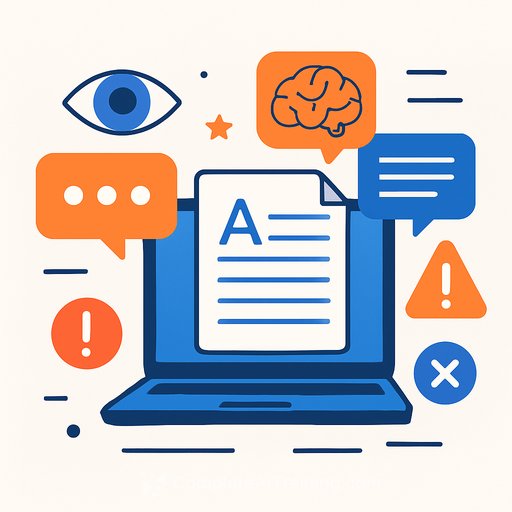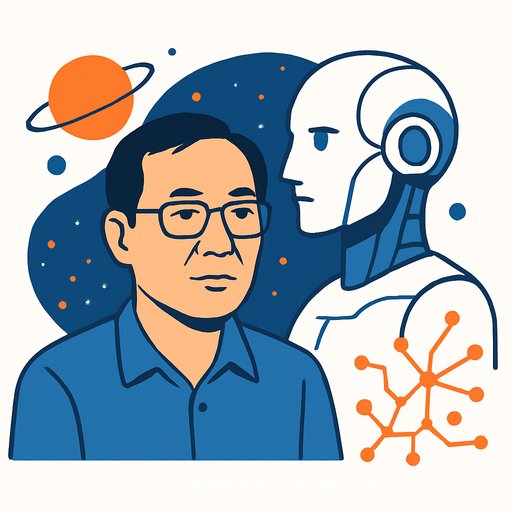AI can't write your college admissions essay. Here's why
As writers, we know voice carries the work. In college admissions, it decides whether an essay sticks or slides to the bottom of the pile. AI can mimic structure and polish, but it can't think, feel, or reflect like a real applicant - and admissions officers are reading for that.
Use AI as a tool, not a ghostwriter. Treat it like a sounding board for research, ideas, and light edits. The essay itself needs a human mind behind it.
The blank canvas test
"A college application is a blank canvas," says Dr. Jennifer Kirk, high school counseling curriculum leader and NACAC member. "Everything that you throw at it should be a bright splash of color… If you throw a completely AI-written essay at that blank canvas, it's just going to wash it out."
Admissions readers want specificity: moments, choices, and insight only the student could write. AI tends to generalize. Generalization kills distinction.
What great essays signal (that AI can't)
Connie Livingston, former assistant director of admissions at Brown University, puts it simply: the best essays show an authentic learner's mindset. That comes from lived experience and self-awareness, not a prompt-complete output.
If the prose is smooth but the thinking is generic, it reads empty. That's the quickest way to "polished but forgettable."
Risks that put essays at the bottom
- Similarity at scale: Thousands of applicants feed the same prompts into the same tools. The output converges. Language, structure, and beats start to look alike.
- Voice mismatch: Overly formal vocabulary or perfect syntax that doesn't align with the rest of the application (recommendations, activities, short answers) is a red flag.
- Facts and logic errors: AI can invent details or misstate information. In a 650-word essay, one bad claim can sink trust.
- Privacy exposure: Personal stories, names, or identifiers you paste into some tools may be logged. Treat prompts as non-confidential.
- Detection cues: Repetitive phrasing, stiff transitions, and "template wisdom" trigger suspicion - especially if the ideas feel bland.
What students are actually asked to write
The Common Application offers seven prompts, capped at 650 words, plus an optional "topic of your choice." Many colleges add their own responses and short answers.
- "Challenges and circumstances" sections can address things like housing instability, caregiving, or community disruption.
- Supplements vary by school. For example, UC Berkeley asks for four "personal insight" responses, and Harvard includes several 150-word answers.
Source prompts: Common App essay prompts and UC Berkeley personal insight questions.
Smart ways to use AI (without losing your voice)
- Research snapshot: Ask for an overview of a department's focus, labs, or faculty, then verify on official pages before citing.
- Brainstorming: Provide 2-3 authentic topics and ask for angles or questions you haven't considered. You choose the direction.
- Outlining: Generate multiple outline options. Pick the one that best supports your story arc.
- Structural revision: Request feedback on clarity, pacing, and repetition. Limit edits to grammar and punctuation.
Skip full-draft generation, stylistic overhauls, and vocabulary upgrades that you wouldn't naturally use. The goal is cleaner thinking, not synthetic voice.
Non-negotiable guardrails
- Check policies: Confirm each college's rules on AI use (and your high school's policy) before you start.
- Protect privacy: Don't paste sensitive or identifying details into public tools.
- Verify everything: Cross-check school facts and claims on official sites.
- Cross-read for tone: Compare the essay's voice with activities, recommendations, and short answers.
- Keep the specifics: Details from your life - dates, locations, outcomes, mistakes - prove authenticity.
A simple writing process that works
- Week 1: Inventory moments. List 10 experiences that changed how you think or act. Pick three.
- Week 2: Freewrite each for 20 minutes. No editing. Choose the one with the strongest insight.
- Week 3: Outline a before-moment-after arc. Draft in your natural voice.
- Week 4: Workshop with a counselor, teacher, or writing center. Revise for clarity and depth, not fancy words.
- Week 5: Line edit for grammar and flow. Read aloud. Cut filler. Submit.
For writers coaching students
- Coach for thinking, not phrasing. Ask questions that surface decisions, trade-offs, and growth.
- Use AI as a research assistant and outline generator - never as an author.
- Teach verification. Build a quick checklist for facts cited about programs, faculty, or opportunities.
- Audit tone across the full application. Consistency beats flourish.
Bottom line
AI can help you research, think, and tighten. It can't supply lived experience or authentic reflection. A good AI-written essay won't get a student admitted - a great, human one might.
If you want structured ways to use AI ethically for brainstorming and editing (without losing voice), explore our curated lessons: Prompt courses and ChatGPT resources.
Your membership also unlocks:






